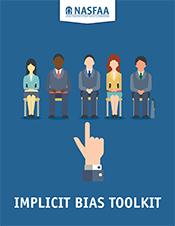Implicit Bias Toolkit
 As individuals, we all have implicit or unconscious biases which are the assumptions, stereotypes, and unintentional beliefs about others based on their perceivable characteristics.
As individuals, we all have implicit or unconscious biases which are the assumptions, stereotypes, and unintentional beliefs about others based on their perceivable characteristics.
Biases can be positive or negative and influence us to have a preference or aversion toward a person or group of people based on our attitudes about them without our awareness. Please consider the following:
- Significant thought happens in our subconscious.
- Implicit associations are created and stored in our subconscious.
- We are likely to act on our biases without even realizing it.
There are steps individuals can take to address the negative impact of implicit bias. These steps include self-awareness, and identifying areas in our lives where implicit biases may affect decision making, behaviors, and judgments. Likewise, we can examine the same facets of awareness and behavior that have, over time, become ingrained in the processes that support our work lives.
NASFAA convened a task force to assist with identifying and reducing bias in the administration of financial aid. Within the following toolkit, there are policies and procedural suggestions that begin to establish a neutral basis from which to build policies and deploy procedures in the administration of financial aid that reduce the operational influence of implicit bias.
NASFAA invites you to reflect and consider that as financial aid administrators, we directly influence the trajectory of our students' lives through our work. We can create a more socially just society if we acknowledge and dismantle the impact of implicit bias in our profession.



